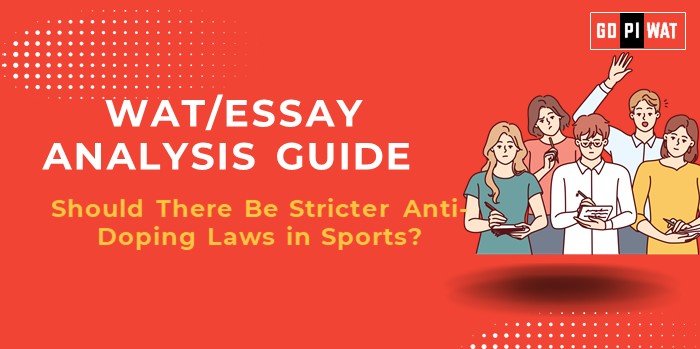📋 Written Ability Test (WAT) Analysis Guide: Should There Be Stricter Anti-Doping Laws in Sports?
🌐 Understanding the Topic’s Importance
Doping undermines the integrity of sports, tarnishing reputations and disillusioning fans. Stricter laws not only deter offenders but also restore faith in fair competition, ensuring that sports remain a true test of skill, discipline, and perseverance.
🖋️ Effective Planning and Writing
- 🕒 Time Allocation:
- Planning: 5 minutes
- Writing: 20 minutes
- Review: 5 minutes
- 📚 Preparation Tips:
- Gather data on doping statistics and notable cases.
- Identify key stakeholders, such as WADA and national sports bodies.
- Research international benchmarks like Norway’s anti-doping model.
📜 Introduction Techniques for Essays
- ⚖️ Contrast Approach: “While athletes achieve greatness through discipline, some resort to doping, undermining the spirit of competition.”
- 🔧 Solution-Based: “Stricter anti-doping laws, paired with technological advancements, can eradicate this menace and safeguard fair play.”
- 📜 Historical Reference: “From the Ben Johnson scandal in 1988 to Lance Armstrong’s confession, doping has plagued sports for decades, demanding a robust response.”
📚 Structuring the Essay Body
- 🏆 Achievements:
- “The WADA framework ensures global consistency, detecting over 1,700 cases annually, showcasing the importance of unified standards.”
- “Biological passports and AI tools have reduced doping instances in cycling by 30% in a decade.”
- ⚠️ Challenges with Comparative Analysis:
- “While Norway’s stringent laws succeed in minimizing violations, lack of enforcement in other nations creates inconsistencies.”
- “Legal loopholes in countries without robust frameworks provide safe havens for offenders.”
- 🔮 Future Outlook:
- “Adopting advanced technologies like AI for detection and increasing funding can bolster global efforts.”
- “Integrating preventive education into athlete training programs can foster awareness and long-term adherence to fair play.”
🎯 Concluding Effectively
- ⚖️ Balanced Conclusion: “Stricter laws are crucial to deter offenders, but they must be paired with education and equitable enforcement to address root causes and ensure fairness.”
- 🌍 Global Comparison Conclusion: “Following Norway’s lead, global adherence to stricter anti-doping laws can level the playing field, promoting a culture of integrity in sports.”
💡 Recommendations for Sustainable Progress
- 🤝 Enhance Cross-Border Collaboration: Strengthen partnerships to close legal loopholes and standardize enforcement globally.
- 🤖 Leverage AI and Advanced Testing: Use data analytics and machine learning to detect patterns and identify offenders more efficiently.
- 📚 Integrate Preventive Education: Provide comprehensive training for athletes on the dangers and ethical implications of doping.
📑 Sample Short Essays
📘 Balanced Perspective:
“Stricter anti-doping laws are imperative to protect the integrity of sports. While penalties deter violations, education ensures awareness, and technological advancements address evasion tactics.”
🛠️ Solution-Oriented:
“Introducing stringent laws and leveraging AI can create a robust anti-doping framework, ensuring fair play and restoring trust in sports.”
🌍 Global Comparison:
“Norway’s anti-doping success demonstrates that strict laws, combined with education and technology, can effectively combat this issue globally.”
📄 Source: Compiled Analysis, 2024


